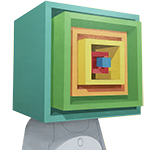Begoña Toledo aka Boxhead
Born in Spain, Begoña Toledo (a.k.a Boxhead) is an internationally grown artist and fashion designer whose work is inspired by urbanism, architecture and our emotional responses to society’s rules.
She started her career in street art while living in Amsterdam as a result of her interest in its aesthetics and social changing potential.
All of Toledo’s work depict her character ‘Boxhead’.
For the artist, Boxhead represents all of us, the box holds our inner space, our fears, our dreams and ideals.
The box gives the character anonymity and a mysteriously approachable vulnerability at the same time. Boxhead questions our notions of identity and self-hood.
Toledo uses street art, canvas and digital painting, animation (2D and 3D) and sculpture as her main artistic mediums.
Some of her most acclaimed murals are: The Rumney Guggenheim 4 story building mural in Williamsburg, Brooklyn, the Red Market mural for Palladium Boots, Pretty Light’s concert backdrop for New Orleans Jazz Fest, Wynwood mural for Art Basel Miami.
Her work has been shown in group and solo exhibitions all over the world including Moniker Projects, London; GoGallery, Amsterdam; Art Bastion, Miami and the grand opening of the Rumney Guggenheim Gallery, Brooklyn NYC, with Olek, Swoon, Olivia Steel and Lady Aiko.
Boxhead has been featured in HiFructose and numerous street art magazines as well as several books including ‘Women Street Artists’, ‘The Wynwood Colouring Book’ and ’New Street Art’.
Since 2021 Toledo is a prominent creator in the NFT space, focusing on digital art and contributing to the developement of Web3 and the metaverse.
Get in touch
info@boxheadbox.com
”Something about her work pertains to categories, being literally ‘put in a box,’ while also defying these categories by denying her audience access to any tangible emotion the subject may be feeling as she walks trough mist, through rain or tears. We don’t know what she’s thinking as she forms part of a manufacturing line, looks down at the landscape around her. We don’t understand – and this feeling is internalised. Do we understand ourselves?
The boxes give these pieces both a private and public life. They are shy and responsive at the same time, protective yet open. We don’t know whether the box is imposed upon Boxhead, or if she is wearing it by choice. We don’t know whether it is a part of her or if she is using it to conceal her true identity. And Boxhead doesn’t privilege us with her subject’s thoughts. It’s a Schrödinger’s cat type situation, in which the subject is both devoid of feelings and overwhelmed, faceless and beautiful, or ugly.
I find it interesting that the subjects are always gendered female, with their typical pocketed dresses and rounded thighs. This speaks to me of a kind of self-awareness, while also conversely pertaining to childhood and uncertainty. According to the artist, Boxhead has “a rebel attitude in the sense of identity.”
Boxhead’s paintings question our notions of identity and self-hood. They speak of gender politics, urban existentialism and consumer culture. They speak, and while I don’t know what they’re saying, exactly, I know I want to listen.”

